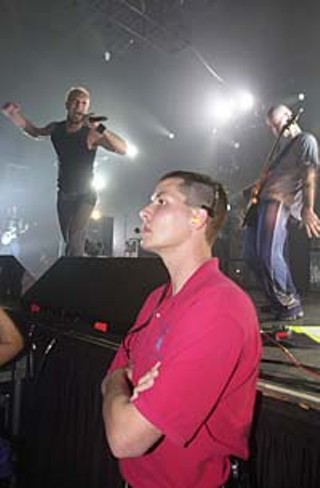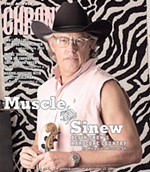Safety Net
A Night on the Job With the South West Emergency Action Team
By Christopher Gray, Fri., Nov. 2, 2001

Around dusk on Tuesday, Oct. 23, a line of humanity snakes down Nueces Street, waiting for the Austin Music Hall's doors to open. Security personnel in black Direct Events golf shirts troll the line, checking IDs, and handing out purple wristbands to those over 21. There aren't many: Though the night's headliner is 311, the Nebraska group whose mid-Nineties fusion of hip-hop, reggae, and metal helped open the door for the likes of Limp Bizkit and P.O.D., maybe one in 10 raise their hands.
Inside, three men, each well over 21 but who will most assuredly not be drinking any alcohol tonight, busily prepare for the long evening ahead. Ted Harris, Matt Shapiro, and Richard Garner are operatives for the South West Emergency Action Team, the Austin company that provides medical and security staffing for local concerts, special events, and movies being filmed in the area.
(S.W.E.A.T., too good an acronym to have only one meaning, also denotes South West Education and Training, an umbrella name for the first-aid and CPR classes taught at the company's South Lamar headquarters under the supervision of president and CEO Tannifer Shipley.)
Most of tonight's Music Hall patrons will be too preoccupied with having a good time to even notice the trio, clad in the standard S.W.E.A.T. uniform of red polo shirt and khaki pants, but the handful for whom the night doesn't go as planned will find out firsthand that even in the most enjoyable of social settings, personal safety is sometimes all too easy to take for granted.
Garner, Harris, and Shapiro set up shop in the far corner of the Music Hall, a location that serves a twofold purpose: right by the street exit should the need for an ambulance arise and far enough removed from heavy traffic areas that they are able to work without undue hindrance from the crowd. Their modest workspace consists of nothing more than a table, a cot, and a few chairs.
Nonetheless, the three, with several bags' worth of paramedic equipment in tow, are prepared for just about any possible contingency, from serious trauma to minor cuts and bruises. A backboard and C-collar rest against the wall; shows that feature crowd-surfing also frequently feature falls. A battery-powered Lifepack 11 (a defibrillator) sits ready for cardiac emergencies. In an ice chest is a cryotherapy kit for heat exhaustion cases, also fairly common at crowded shows (though more so at outdoor events than indoor). A heavy suitcase contains a full complement of medications, allowing them to treat everything from diabetes, seizures, and asthma to dehydration and overdoses. Possibly the most important piece of equipment is the radio headset each wears, which allows them to keep in constant communication with each other, and also for security personnel to alert them immediately at the first hint of trouble.

After checking their supplies and making sure the battery packs are fully charged, the S.W.E.A.T. medics have little to do but wait, so they might as well pass the time answering a reporter's background questions. Shapiro, at 32 the eldest of the three and the only paramedic onsite, has been with Austin EMS for three years. Before that he worked in Southern California as a "stage medic" on movie and music-video sets, which he enjoyed, though it was sometimes difficult because "stuntmen never tell you when they're hurt." Tuesday is his first concert as a member of S.W.E.A.T.; he's picking up a little extra cash to pay for his upcoming wedding.
Harris, 25, and Garner, 30, are both EMTs for Travis County. Paramedics have more training than EMTs and are able to do things like start IVs, intubate patients, dispense medications, and interpret EKG readouts. Shapiro, though, is quick to point out "behind every good paramedic is an EMT."
Harris, who came to Austin from his tiny Alaska hometown to go to fire school, has been with S.W.E.A.T. for a year and says, without irony, working shows is a nice way of "taking a break from things." Garner, the only native Austinite among the three, is also the senior member of the crew with two years' S.W.E.A.T. experience.
All three are music fans. Garner and Shapiro fondly reminisce about their concert-going days in the Eighties and discover a shared affinity for Oingo Boingo and New Order, to which Harris humorously interjects "I was in elementary school." Asked some of his favorite recent shows, Garner says "definitely" Incubus' Oct. 9 Music Hall date and the B.B. King Festival at Auditorium Shores, plus Crosby, Stills & Nash at the Backyard.
"If you enjoy the music, that's part of it, but [our] first priority is to stay alert," he says.
Anticipating how busy they'll be at any given show is largely a guessing game, dependent on both the kind of music and the type of crowd. Any show with a mosh pit will likely see a few injuries, both because of bodies slamming into each other and the high amount of heat generated in a relatively small area. Along with metal and reggae shows, raves are likely to have a high incidence of drug-related cases. Drugs often figure in the more outrageous incidents, like the time a ravegoer showed up at the medic tent without a stitch of clothing on and proceeded to regale Garner and colleagues with his unintentional Jim Carrey impressions. He eventually wound up, says Garner, "in the hospital or jail, I'm not sure."
Alcohol consumption is also a major factor, so much so that they have a special code, "ETOH," derived from its chemical formula. Still, it's hard to be sure. Garner notes the previous Friday's sold-out Tenacious D concert, where the bar lines were three or four times as busy as tonight's, ended with only a couple of heat-related incidents. He's sure they'll see plenty of activity at the upcoming Queensrÿche show, and tells of a recent patient, complete with Queensrÿche tattoo, who started singing to him while being treated: "I'm sure he'll be there."

After good-naturedly arguing with Garner over which of them gets to go up front to keep an eye on the pit (both are 311 fans), Harris heads toward the stage, where he'll stand ready to administer aid to anyone subjected to what he calls a "compression" injury. Things progress uneventfully through the opening set by nü-metal newcomers Alien Ant Farm, the California group whose cover of Michael Jackson's "Smooth Criminal" was a summer-long MTV and radio staple. The medics hardly mind this lack of activity, however brief it may last.
"When we don't have to help anyone, that's a good day for us," Shapiro says.
They don't have to wait much longer. Right as Alien Ant Farm says goodnight and launches into "Smooth Criminal," a tattooed-and-pierced guy helps his friend, a young blond male with a black button-down Slipknot shirt and a definite glazed look in his eyes, over to the S.W.E.A.T. area. Garner and Shapiro spring into action, checking his pupils and taking his blood pressure before ushering him over to lie down on the cot. The medics' most useful tools in these situations -- when neither they nor the patient knows precisely what's wrong -- is a raft of questions that help them determine what, if any, further action to take. For example:
How long have you been feeling like this?
What were you doing when you started to feel this way?
Have you been hit in the head or passed out?
Have you taken any drugs or alcohol?

(for females) Are you currently menstruating?
Another option is to administer what they call a tilt test, where they lay the patient down and instruct him or her to sit up. If the dizziness persists, it's a sign further medical attention is required. The potential for heat exhaustion here is high, as the symptoms include feeling weak, dizzy, and nauseated. Thankfully, treatment is simple: get the patient into a cool environment where he or she can rest and drink plenty of fluids. Taking off the shirt is also helpful, because Garner notes a sweat-soaked shirt can act "like a blanket."
Before 311 takes the stage, Garner grabs the backboard and hurriedly follows a security man across the Music Hall to the corridor where the bathrooms are located. There, a girl with platinum-blond hair and low-cut jeans is sitting against the wall. Garner begins talking to her and eventually leads her back over to the S.W.E.A.T. area, where they sit her down, take her blood pressure, and bring her some water. Shortly thereafter, another Music Hall security worker comes up to Shapiro with a report of a girl passed out in the men's bathroom.
"I think we're about to get busy," he notes.
He's right. A goateed bald man soon staggers over and sits down. Out on a fire exit, a girl in a black tank top is sitting down on the steps and appears to be either sobbing or hyperventilating in her boyfriend's arms; Garner walks her back, sits her down, and takes her blood pressure. Two people carry a brunette in a 311 wifebeater over, and Shapiro immediately goes to get her some water. Somewhere in all this, someone has vomited on the concrete floor near the stairs leading to the balcony. Not surprisingly, no one else seems to notice.
Thankfully, none of these injuries appear too severe. The bald guy soon gets up, hugs Shapiro, and walks back into the crowd. About three or four songs into 311's set, the platinum blonde gets out of her chair and walks away, hand in hand with her date. The girl from the fire exit seems to be feeling better, kissing her boyfriend, singing along with the band, and watching Shapiro attend to the girl on the cot, who he tells "this is the only time you'll get waited on hand and foot -- enjoy it." The ability to communicate sympathetically with patients is absolutely essential.
"You don't judge 'em," Shapiro says a bit later. "You just talk to 'em, try to make 'em smile."

Things die down a bit after all this; the only new patient is a red-faced girl who is promptly given some water. 311 begin to play their radio hits, including "Down" and "Come Original," signaling the end of the show is near. It looks like the night will conclude without any major drama, but this is not to be.
The lights go up, but the show isn't over. Less than a minute later, all three medics emerge from the crowd carrying the backboard. Strapped to it is a very scared-looking girl who fell while crowd-surfing. Shapiro immediately borrows a bystander's cell phone and calls for assistance while Harris secures the girl's neck to the backboard with masking tape, and Garner heads outside to await the ambulance. Somewhat tentatively, the band begins to play its encore -- after sending their best to the unfortunate fan.
An ambulance arrives within minutes, and all three medics carry the girl out to a waiting gurney. It turns out the S.W.E.A.T. people were able to reach her, strap her to the backboard, and carry her to the back in about 30 seconds.
"I was really happy the crowd cooperated," notes Garner.
"She should be OK," says Harris. "Maybe an X-ray or two."
Earlier in the evening, Garner said something that would prove all too prophetic: "A lot of kids come out to have a good time, [but] all it takes is one wrong choice and they go from being patron to patient."
The crisis passed, the S.W.E.A.T. guys begin packing their gear and winding down, as friends in the crowd stop by to say hello and chat a bit. The buzz of excitement from the backboard incident has barely had time to die down when it becomes clear that some people are fated to remain oblivious no matter what happens.
A young man, sweaty, shirtless, and out of breath, approaches the S.W.E.A.T. table. He has a question he needs to ask.
"Umm ... Is this where the T-shirts are?" ![]()







